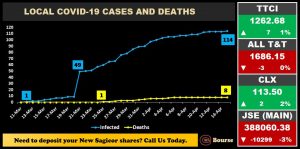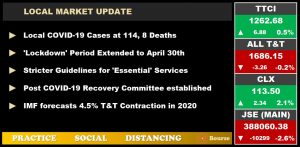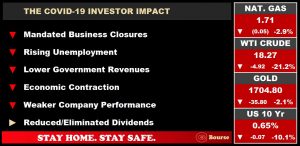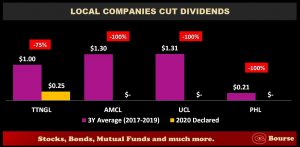BOURSE SECURITIES LIMITED
20th April, 2020
The Dividend Dilemma
This week, we at Bourse take a look at the emerging trend of local companies reducing/eliminating dividends in light of the extreme uncertainty introduced by the COVID-19 pandemic. We also provide an update on COVID-19 developments locally and the various measures being implemented by the government to continue flattening the curve.
Local COVID-19 Cases Contained for now

Against the backdrop of more than 2.3 million COVID-19 cases worldwide, Trinidad and Tobago has recorded a number of 114 confirmed cases and 8 deaths to date. Since the first reported case on March 12th, the number of infected persons had gradually risen until the spike resulting from the return of 40 cruise ship passengers. Recently, however, the rate of confirmed cases has slowed significantly. The number of deaths has also remained stable at 8 since the first death recorded on the 25th March.
The government has continued to implement an array of measures in an effort to “flatten the curve”. Major recent measures had included:

- An extended ‘lock-down’ period until April 30th of non-essential services.
- The closure of all food businesses and stricter restrictions on essential business operating hours, which has been enforced by the TTPS.
- The decision by the Ministry of Education to keep schools closed, with the increasingly likely prospect of a September 2020 restart.

Company Dividends Come Under Pressure
While not necessarily threatening long-term viability, the anticipated extended financial impact of COVID-19 has caused several companies to reevaluate their discretionary cash outflows in the form of dividends. As COVID-19 continues to affect nearly all aspects of daily life, companies have implemented measures to safeguard not just the wellbeing of employees, but also the longevity of shareholder value and company stability.
The second calendar quarter of 2020 is likely to see greatly reduced consumer activity, which could result in weaker company financial performance.
Dividends Reduced

COVID-19 continues to send shockwaves across the economy, spurring companies to take critical steps in regards to its cash management. As investors digest earnings releases of investee companies, they are faced with the reality that for many entities, the ability to pay dividends has been comprised as uncertainty lies ahead. Trinidad and Tobago NGL Limited (TTNGL), Ansa McAl Limited (AMCL) and Unilever Caribbean Limited (UCL), all recently releasing their FY 2019 financial results, have made a decision to reduce or not pay dividends as a result of the impact of the COVID-19 pandemic. Prestige Holdings Limited (PHL), having most recently released its Q1 2020 results, has also taken the decision to reverse its dividend decision given economic conditions.
Over the course of FY 2019, TTNGL has suffered by lowered energy prices, dampened production volumes and an increase in raw material costs. Coming into the new year, the chief issue plaguing TTNGL’s profitability has now been exacerbated, this being energy prices. Excess supply within the energy market has suppressed prices and with demand unlikely to recover soon given travels ban, concern remains as to when energy prices may regain its footing. Given the unprecedented impact of COVID-19 on the global economy and by the extension the energy market, compounded with TTNGL’s decision to acquire Twin Eagles Liquids Marketing LLC in the US, the company appears to have elected to act prudently, protecting its cash position by reducing its final dividend. TTNGL has reduced its final dividend to $0.25, a $0.75 cut from its typical payment of $1.00.
PHL meanwhile has flagged concern due to its inability to operate until at least 30th April under measures put forth by the government to mitigate the spread of the highly contagious coronavirus. At the end of its first quarter for fiscal 2020, PHL reported a 45% increase to its Earnings Per Share. Despite starting fiscal 2020 with an uptick in performance, the company has reversed its prior decision to pay a final dividend of $0.20. PHL operates a total of 129 restaurants and employs approximately 3,500 people. The partial funding of salaries for its workers during a period of non-operation, without any revenues coming in, will place PHL’s finances under some strain.
Locally-based conglomerate AMCL, which is heavily exposed to the cyclical nature of consumer discretionary spending, is likely to experience some headwinds to its performance given the economic conditions posed by COVID-19. The closure of bars and restaurants, the limitation of business hours of other companies and shifts in the employment rate are expected to affect AMCL’s revenue generating abilities across a multitude of segments. AMCL’s final dividend has averaged $1.30 over the past 3 years. The Group has, however, opted to not pay a final dividend for FY 2019. AMCL has taken this decision in order to preserve its balance sheet, given the uncertainty surrounding the economic extent of the COVID-19 virus.
Unilever Caribbean Limited (UCL) which has recorded declining profitability for some time, has made the decision to not pay dividends for FY 2019.
Under the current conditions, it appears likely that changes to dividends could become more prevalent across most sectors. Investors will be looking keenly at the Banking Sector, whose stocks are often viewed as one of the most consistent group on the Trinidad & Tobago Stock Exchange (TTSE), with the significant slowdown in economic activity and the commensurate impact on banks (greater loss loan expenses, lowered interest income etc.).
Pros and Cons of Dividend Cuts
Cutting Dividends has different repercussions for shareholders; we will examine the pros and cons below:

PROS
- Improved Cash Flow Management – With companies experiencing reduced cash flows as a result of depressed demand due to the COVID-19 pandemic, cutting dividends is a strategy which can preserve cash flows. These preserved cash flows can now be used for other important ventures to keep the company afloat such as paying interest and meeting debt obligations.
- Lower External Financing – Cutting dividends allows for freed up cash to be used to meet debt obligations, there may be less need for the company to borrow from any external sources thereby preventing a higher leveraged balance sheet.
- Prudence – With very limited visibility on future economic prospects, reducing dividends is a practical and prudent approach to preserving a company’s financial strength, ultimately preserving the value of the investor’s equity stake in the company over the longer run.
CONS
- Increased Investor Uncertainty – Cutting dividends may reduce investor confidence, if viewed as sign of a company’s weakness.
- Downward Pressure On Stock Price – As investors react to dividend cuts, the lack of payments from the company coupled with reduced faith in its profitability may cause many to sell their stock, ultimately pushing the stock price down.
Investor Considerations
With an increasing number of local companies announcing reduced or even no dividend payments due to the negative economic impacts of COVID-19, investors may be wondering how they should respond in order to reduce losses and maintain profits during this uncertainty. The question remains, should I buy or should I sell my stock? The following are a number of factors which can be considered to answer this question.

BUY
- Higher Risk Tolerance – Investors with a higher risk tolerance could consider acquiring stocks under the current circumstances, bearing in mind that prices could potentially fall further. Uncertainty arising from dividend cuts and subsequent lower stock prices can present an attractive entry point for investors who will now have an opportunity to buy a stock that is priced lower than its actual value.
- Long Term Appreciation – Investors with a longer-term investment horizon could consider the recent market correction as a possible entry point.
- Lower Current Income Needs – Dividend reductions are likely to be temporary in nature, though the length of changes to dividend policy is unknown. Investors with lower income requirements could consider acquiring stocks in the current circumstances, whose prices may adjust as income-seeking investors sell their positions.
SELL
- Lower Risk Tolerance – Investors with a lower risk tolerance could consider selling stocks under the current circumstances, to avoid any further decline in prices which dividend cuts may bring.
- Liquidity/Cash Flow Requirements– Investors with greater current income or cash flow needs might consider reducing holdings of stocks which are adjusting dividends downwards in the current environment.
- Opportunity Cost – Investors with alternative opportunities to generate income might consider reallocating their investments away from stocks and into alternative income-bearing investments.
For more information on these and other investment themes, please contact Bourse Securities Limited, at 226-8773 or email us at invest@boursefinancial.com.
“This document has been prepared by Bourse Securities Limited, (“Bourse”), for information purposes only. The production of this publication is not to in any way establish an offer or solicit for the subscription, purchase or sale of any of the securities stated herein to US persons or to contradict any laws of jurisdictions which would interpret our research to be an offer. Any trade in securities recommended herein is done subject to the fact that Bourse, its subsidiaries and/or affiliates have or may have specific or potential conflicts of interest in respect of the security or the issuer of the security, including those arising from (i) trading or dealing in certain securities and acting as an investment advisor; (ii) holding of securities of the issuer as beneficial owner; (iii) having benefitted, benefitting or to benefit from compensation arrangements; (iv) acting as underwriter in any distribution of securities of the issuer in the three years immediately preceding this document; or (v) having direct or indirect financial or other interest in the security or the issuer of the security. Investors are advised accordingly. Neither Bourse nor any of its subsidiaries, affiliates directors, officers, employees, representatives or agents, accepts any liability whatsoever for any direct, indirect or consequential losses arising from the use of this document or its contents or reliance on the information contained herein. Bourse does not guarantee the accuracy or completeness of the information in this document, which may have been obtained from or is based upon trade and statistical services or other third party sources. The information in this document is not intended to predict actual results and no assurances are given with respect thereto.”

